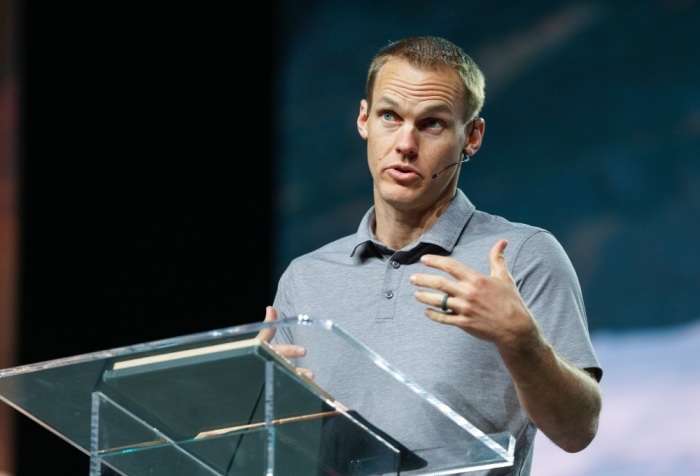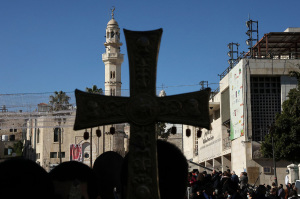David Platt laments 'idolatry of personal and political convictions' in the Church, issues call to unity

Over the last five years, David Platt, pastor of McLean Bible Church near Washington, D.C., began noticing a disturbing trend in the Church: Instead of being eager to unite around Jesus, the Body of Christ was becoming increasingly quick to divide over what he refers to as the “idolatry of personal and political convictions.”
It was out of this growing concern for the American Church that Platt, an author of three New York Times bestsellers, penned his latest book, Don't Hold Back: Leaving Behind the American Gospel to Follow Jesus. In it, he warns that the “American gospel” — an ideology he says “prostitutes Jesus uses Jesus for the sake of comfort and power and politics and prosperity in the world — for the true Gospel.
The ramifications of this, he said, are deadly.
“If we’re not careful, we can conflate the Gospel with American ideals and values and power and politics, and in the process, lose the way of Jesus,” Platt told The Christian Post. “What He's called us to is so much bigger than what we are tempted to get caught up with in this world, and particularly my country, with the pursuit of comfort and power and politics and prosperity here.”
The Church must unify around “the hope we have in Jesus,” Platt said, citing Romans 15. His deep desire is to see the Church united around the person of Jesus, rather than being divided by personal and political convictions that often take precedence over the Gospel.
In his book, Platt categorizes convictions into three buckets: The first bucket represents the non-negotiable core beliefs of the Gospel and the authority of God's Word; the second consists of convictions that may vary among different local churches, while the third bucket encompasses issues on which believers can agree to disagree.
“We need to make sure we know which beliefs go in which bucket,” he stressed, adding that particularly during the last election, many people “put how you voted in the same bucket that we put the atonement of Jesus and the Trinity.”
“No, these are not the same,” he said. “And so we need to be careful not to mix those buckets and then careful to remember how to love people who have convictions in different buckets.”
Platt emphasized that while politics and comfort have their place, they should never overshadow the call to live for another world and prioritize the eternal Kingdom of God.
“I'm not saying politics aren't important, and I’m not saying all comfort is all bad,” he clarified. “But I'm saying we've been called to follow One who beckons us to die to ourselves in this world and to live for another world altogether, not to live for a country that one day, like all other countries, is going to fall and to live for a Kingdom that's going to last forever. And that changes the way we live here.”
According to Platt, fractures within the church, particularly regarding racial issues, have existed for a long time. But recent years have seen these tensions come to the surface due to political and cultural turmoil, he said, expressing hope that this moment will be used as an opportunity to address and rectify the racial divisions that have plagued the Church for centuries.
“How can we experience the multi-ethnic beauty of the Church? How can we make sure we're seeking God not as a means to an end, but as the end?” he asked. “How can we be intentional about showing counter-cultural compassion in the world and doing justice in a world of injustice?”
A November 2022 study from Barna found that less than one-third of pastors (30%) report often speaking on unity between people of different political beliefs; only 23% of Christians report hearing this.
Furthermore, 28% of Christians report hearing their pastors speak on unity between congregants and people of other religious beliefs, yet only 12% of pastors say this is true.
When addressing hot-button and political issues from the pulpit, Platt advised pastors to prioritize clarity on issues where the Bible speaks directly and clearly. While acknowledging the significance of political topics, he warned against allowing the world's agenda to dictate preaching and teaching.
“The key for me as a pastor is to make sure where the Bible speaks clearly and directly that I'm speaking clearly and directly,” he said. “For years, I was silent about abortion. And I just kind of saw that as a political issue. And then I was reading Psalm 139 one day, and I'd read it before, but God just opened my eyes in a fresh way: This is a biblical issue far before it's a political issue.”
“I think many times we as pastors, if we're not careful, can be selective about the issues we will address or won't address from the Word based on the political party that most people in our church may align with,” he added. “And that's where we've got to be really, really careful that the world's not setting the agenda for what we're preaching and teaching, but it really is God's Word that’s setting that agenda.”
Platt challenged believers to fight for unity and move beyond debating justice and actively engage in pursuing and practicing justice in a world filled with injustice. He reminded Christians of their primary purpose: spreading the Gospel to all nations, as commanded by Jesus.
Participating in global missions, he emphasized, is not reserved for a select few, but is the calling of all Christians.
“Our purpose on the planet is not to promote the greatness of our nation, it's to spread the Gospel to all nations,” he said. “We have more opportunities than ever before in history, to spread the Gospel to the ends of the Earth today than any other people have ever had.”
The pastor said his book is intended for “discouraged and disillusioned and divided Christians” as well as the next generation he says has looked at the Church in recent years and thought “there was more to Jesus than this.”
“In all this, I think one of my biggest concerns is to call the Church to see that Jesus is not a means to an end; He is the end. He is the One. God Himself is the goal of the Gospel. If we're not careful, we can subtly look to him as a means to a variety of other ends that will fall far short of what our hearts were created to find satisfaction in,” he said.
“I wrote this book to say, ‘There is so much more to Jesus and so much more than the Church … and we can experience awe-filled wonder at Jesus and the otherworldly beauty of the Church. But some things need to be different, not just to those people out there, but starting in us.”
Leah M. Klett is a reporter for The Christian Post. She can be reached at: leah.klett@christianpost.com





























